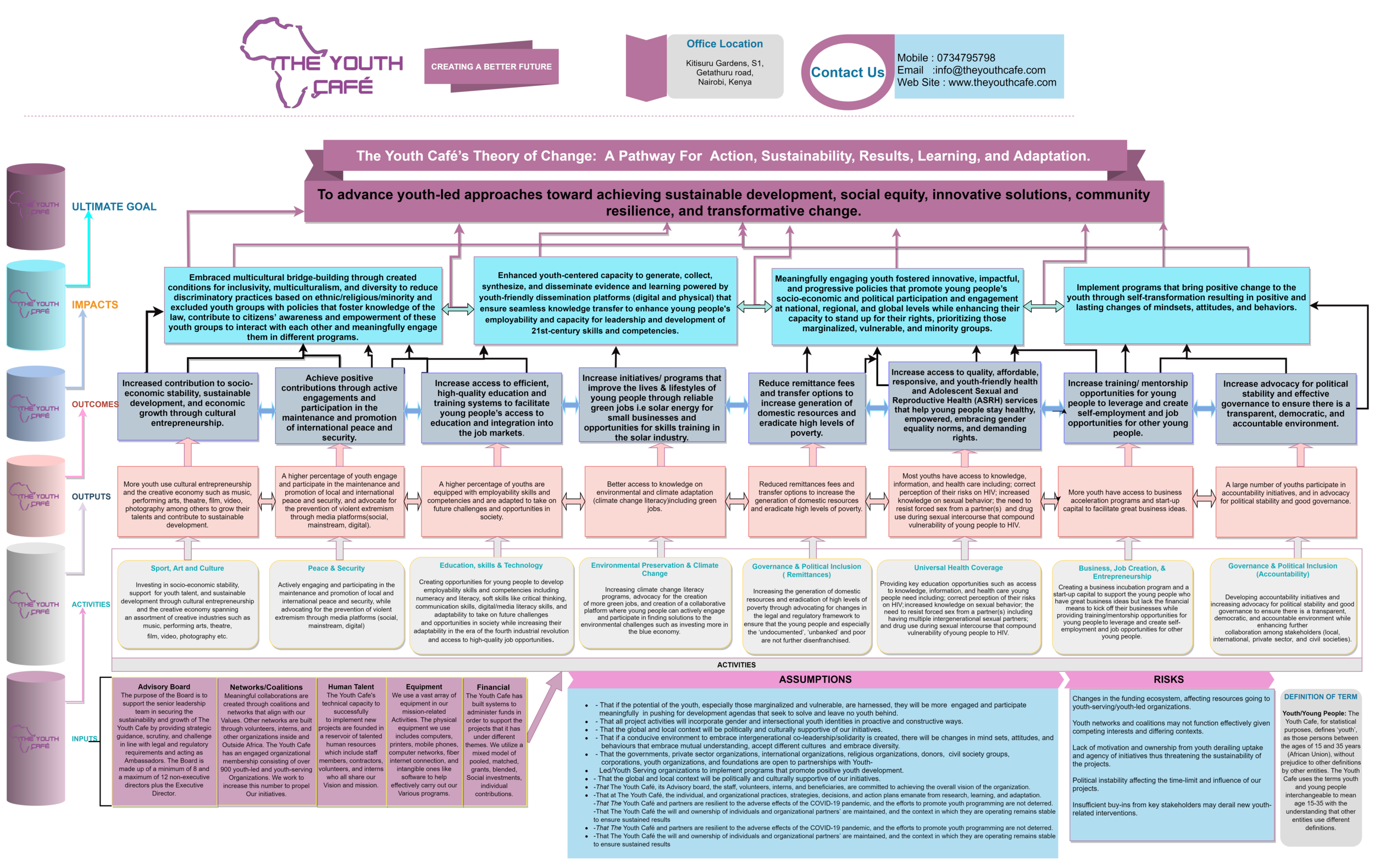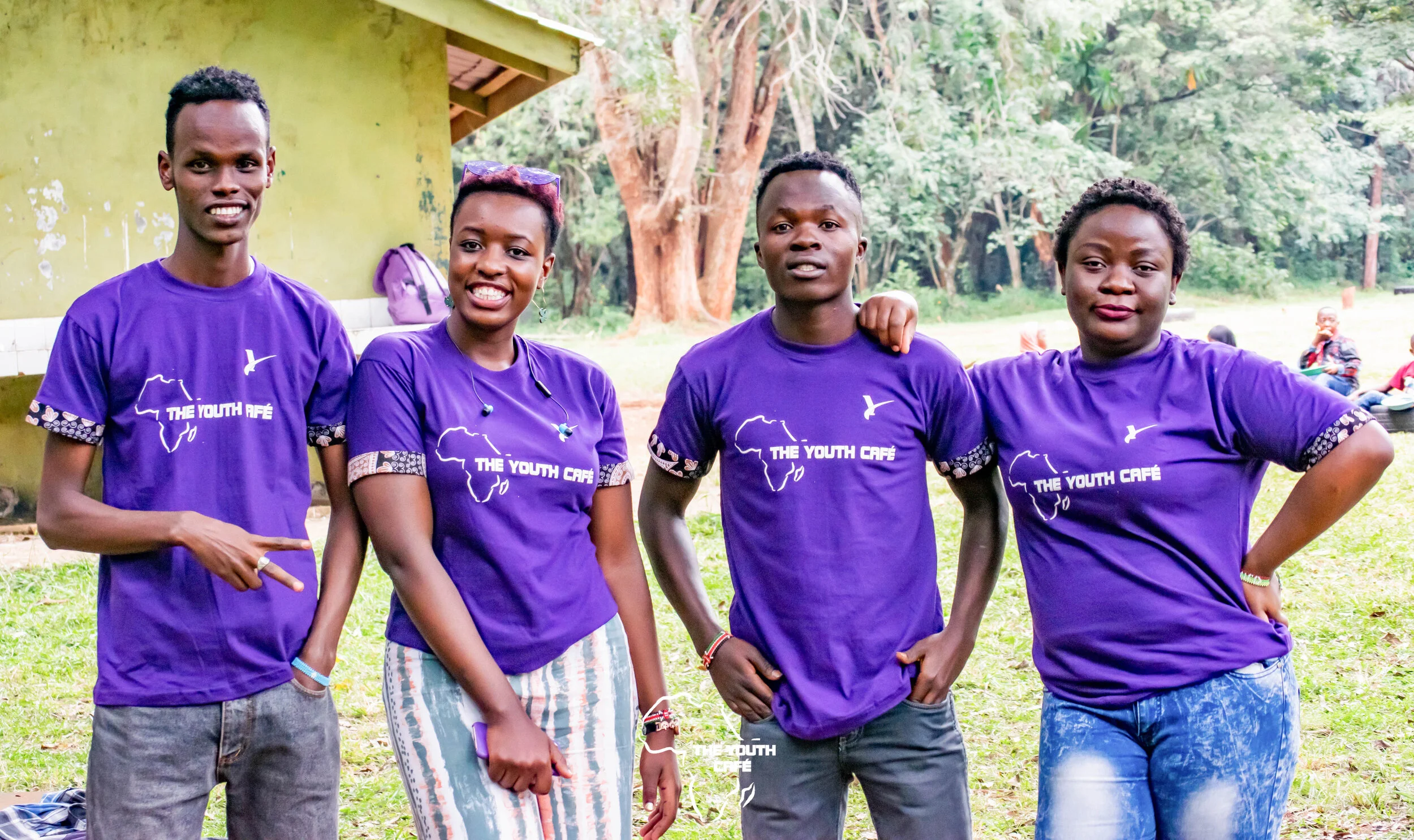The Youth Cafés Theory of Change:
A Pathway For Action, Sustainability, Results, Learning, and Adaptation.
Introduction
In this theory of change, we use techniques that match our tolerance for "planning" vs "doing". We have worked to develop a Theory of Change, a visual diagram that depicts relationships between The Youth Cafés inputs, activities, outputs, outcomes, and impacts. These impacts include both short- and longer-term outcomes and also reflect changes at different levels, such as individuals, organizations, systems, and communities. We have incorporated the views of young people, youth-led and youth-serving organizations, and experts so that our map reflects young people’s view of how change occurs. Additionally, we have documented the assumptions and risks on which we have based our change effort.
Types of changes mapped in our Theory of Change
Positive Youth Development initiatives typically encompass myriad strategies, interventions, and activities. Some are planned, clearly defined, staffed, and funded – for example, an awareness-building campaign or community mobilization effort. Others may be spontaneous, emergent, informal, or sporadic, such as networking, leadership development, or network/coalition building. As an organization, we are cognizant of the fact that we need to have the relevant resources and investments to ensure that the activities/interventions take place accordingly. Such resources include funds, networks and our knowledge, and thus we refer to them as inputs. Our outputs are the immediate results of our activities and they are necessary in achieving the outcomes. They are positive indicators that the outcomes are on track.
Principles
The Youth Café Principles have been developed by over 1,500 of our members drawn from the East- and the Horn of Africa, the Middle East and North Africa, and the Sahel Regions coordinated by The Youth Cafés Secretariat. The principles are a call to action for governments, civil society, private and public sector, bi- and multilateral and knowledge institutions to invest in the prospects of young people and to work in partnership with young people. These principles call upon organizations to recognize and invest in an inclusive manner and specifically in the opportunities of youth- recognizing the unique challenges they face and ensuring that no young person is left behind.
The summary below illustrates different types of inputs, activities, outputs, impacts, influences, and leverage outcomes, representing the most likely steps on the pathway to community change. They provide examples of impact at both individual and population levels as well as changes in influence and leverage that may result from The Youth Cafés efforts.
How do impacts, influences, and leverage outcomes relate to The Youth Cafés core capacities?
The Youth Cafés core capacities are the central guides that enable our powerful strategies to become actualized. Our core capacities represent our beliefs and our deeply held values for development. We understand that lasting change is created through unique opportunities for unique problems facing different societies. Our work in youth development is geared towards forming outstanding ideals that separate the organization from others. We truly believe that our building blocks will continue to impact the change we seek to see in youth and youth stakeholders. All the projects that The Youth Café handles are founded on the capacities we have established and continue to strengthen. These capacities include our administrative structures, professional and social networks, knowledge base, and leadership.
Outcome Map: Our Goals, Strategies, and Impacts
Creating a picture of how different types of outcomes relate to each other helps clarify what The Youth Café intends to do. We use the “outcome map” as a tool to depict what we expect will happen as a result of our initiatives, strategies, activities, and programmatic efforts. Using an outcome map, we have visually laid out The Youth Cafés pathway of change. Our outcomes are “mapped” in a causal sequence, although we understand that change is typically more complex than a simple cause-and-effect relationship. In some cases, our outcomes occur sequentially, while other times they occur simultaneously. The Youth Cafés outcomes sometimes occur independently from each other or are highly interrelated. They may result from a single strategy or multiple ones, leading to common goals or separate ones.
“So That” Chains
In order to create an outcome map that helps to clarify the connection between all outcomes – those describing impact, influence, and leverage – we have created a “so that” chain. The “so that” chains reflect the work of building core capacities as well as implementing specific strategies, activities and program actions. Impacts, influences, and leverage outcomes are achieved when The Youth Cafés core capacities are developed and well functioning. We took our first strategy listed and created a "so that" chain based on the following question:
"Why do X strategies so that Y results are realized for The Youth Café or young people?"
The answer is the direct outcome or result of the strategy. We repeat the procedure until all the four strategies have been linked to the goal.
Assumptions and risks
Articulating our Assumptions. While The Youth Cafés outcome map offers a visual sketch of the pathways to achieving our outcomes, our work is embedded in a context. It is helpful to complete the story by articulating the assumptions that influenced the map's design. Outlined below are the core assumptions that underpin The Youth Cafés Theory of Change. These explain why and how the steps in our Pathway of Change diagram enable the achievement of empowerment for young people.
Conclusion
The Theory of Change is a necessary tool for the development of an organization, and the transition of inputs and activities to outputs, outcomes, and impacts. It creates a shared understanding of the changes that take place in an organization and the parties involved in that process. This detailed document is developed by relating all the aspects of the organization that direct us to our ultimate vision and mission. The Youth Café understands the importance of managing change in an organization as the guide towards achieving the goals set ahead. Impact changes at the organizational and population-level drive the organization to a defined future effect in youth development. The impact changes anchor the transformation requirements, designs, and processes to our desired state.
Glossary of terms
Throughout the Theory of Change, we use certain words, terminologies and phrases that are unique to The Youth Café.












Our LEVERAGE: Outcome Areas And Outcome Statementsfocuses on different changes such as improving The Youth Cafe and other Youth-Led and Youth serving partner organization abilities to finance their own economic and social development by promoting a comprehensive Agency approach to help the organizations mobilize public revenues and expend resources effectively, transparently, and with accountability, while creating the enabling conditions for private investment.